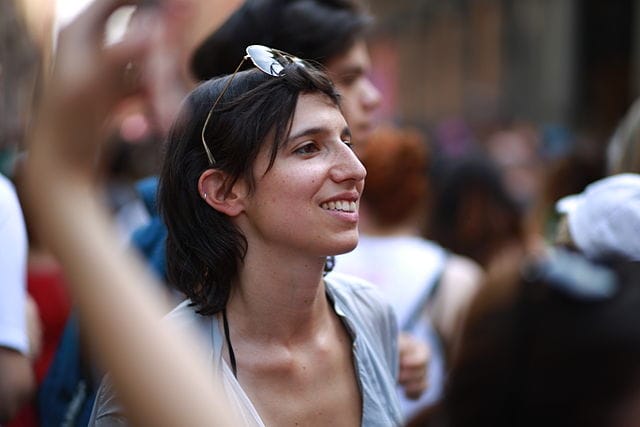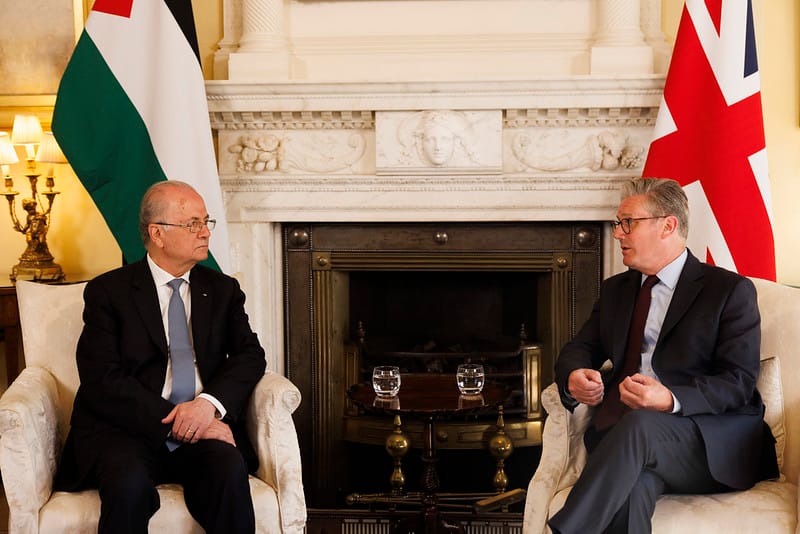
Only months after Giorgia Meloni became the country’s first female prime minister, as leader of the “post-fascist” Fratelli d’Italia (Brothers of Italy) party, now a second woman occupies one of Italy’s highest seats of political power. This time, however, she comes from a stridently antifascist background, and is of Jewish heritage.
37-year-old Elena “Elly” Schlein “stunned” the liberal establishment in late February by winning the primary leadership race of Italy’s beleaguered centre-left Democratic party (PD), defeating the centrist favourite Stefano Bonnaccini. Promoting a form of social democracy that represents a rupture from PD’s years of cautious technocracy, she speaks of “precarious Italians” and the introduction of a statutory minimum wage alongside an environmentalist, feminist, pro-migrant and LGTBQ+ agenda.
Schlein is deemed an outspoken force of opposition against Meloni’s nationalist-traditionalism, shifting PD away from its prior position as a centrist buffer between “extremes”. She even quit the party in 2015 in protest of then-prime minister Matteo Renzi’s neoliberal direction, only returning to the fold two weeks prior to the start of the primary race. And thanks to a rule change ahead of the election that opened up the voter registration system, her victory was driven in large part by the mobilisation of non-party voters.
Not only is Schlein the country’s first female leader of the opposition and the first from a leftwing orientation, she is also the first to be openly bisexual and in a relationship with another woman – in a country known as the heteropatriarchal progenitor of bunga bunga and Berlusconismo. Her meteoric rise has invited parallels with Alexandria Ocasio-Cortez, and Schlein’s outlook is certainly internationalist.
“We are suffering from the internationalism of the nationalisms”, she said in a recent interview, pointing to the unity of Le Pen, Farage, Trump, Salvini, Meloni and Bolsonaro. While those leaders “all speak the same language”, progressives, she warned, are “not doing this enough”.
Meloni and Schlein are pitted as diametrical opposites, despite their shared pro-EU, anti-Putin outlook (which, incidentally, marks a break on the right from Matteo Salvini’s Lega). If Meloni’s white Christian nationalism – drawing from the US Republican party – harks back to Italy’s 20th-century past, with its support for fixed gender roles and strong borders, Schlein stands for inclusivity and fluidity, proposing an intersectional, “rainbow” progressivism.
Mimicking Meloni’s famous speech in October 2019 – “I am Giorgia, I am a woman, I am Italian, I am a Christian! They can’t take that away from me!” – Schlein wryly responded that she didn’t understand how being “a woman, a mother and a Christian helps Italians to pay their bills”. She added: “I love another woman. I am not a mother, but I am not less of a woman for this.”
Moderates are warning that Schlein could provoke a split of the centre left, with two prominent leaders in the party already stepping down. The more radically inclined, by contrast, remain sceptical about the potential for “militancy” from inside the PD. The only certainty is that Schlein’s victory has breathed new life into a stagnant party that has until now failed to keep pace with the rapid ideological flux sweeping the country – and, in doing so, opened up a long-suppressed conversation about Jewishness in Italy today.
Unacknowledged yet unavoidable
Remarkably, Schlein is one of only two Italian party leaders of Jewish heritage since the first world war, alongside PD’s former secretary Nicola Zingaretti. Yet this part of her identity received little attention during her election campaign; indeed, the subject has been shrouded in a kind of conceptual haziness. Understanding why requires digging much deeper into Italy’s past.
While the word “ghetto” is most commonly associated with either Nazi Germany or racial segregation in the US, fewer know that the word’s origins are actually Italian. I ghetti ebraici (Jewish districts) can still be found scattered across hundreds of Italy’s towns and cities – an enduring symbol of the economic, religious and legal restrictions placed on Jews by decree of Pope Paul IV in 1555. These restrictions lasted until formal emancipation in the early 19th century, before the racial laws of 1938 instituted by Mussolini’s fascist regime renewed the restriction of the rights of Jews alongside other minorities.
This history sits uncomfortably with the enduring Italian self-understanding as the sun-drenched land of hospitable brava gente. The thousands of tourists milling through Italy’s idyllic towns every summer, too, mostly remain unaware of the historical significance of the ghetti ebraici. But there is something about this dissonance that speaks to the silence surrounding the question of Jewishness in Italy today, with a community numbering only 30-45,000 but whose history on this predominantly Catholic peninsula dates back 2,200 years.
Like the ghetti, both unassuming yet situated in the heart of Italy’s ancient urban centers, the question presents something of a contradiction, unacknowledged yet unavoidable. Is it only a matter of time before a certain unravelling takes place?
For her part, the new leader of the opposition has largely played down her heritage. “Schlein is ambivalent about her Jewishness,” explains Bruno Montesano, a 27-year-old Italian-Jewish PhD candidate at the University of Turin, and a contributor to the leftist newspaper Il Manifesto. “Much more relevant [to her campaign] was her defence of LGTBQ+ people and migrants,” he adds.
Schlein admits that while being “immensely proud” of her heritage, she does not actually consider herself Jewish given that, according to halacha, Judaism is passed down through the mother’s side. Her maternal grandfather, in his role as president of the senate’s judiciary committee, was a noted defender of Jews during Mussolini’s rule, but Schlein’s Jewish heritage comes from her father’s side: her paternal grandfather (whose surname was originally “Schleyen”) left Ukraine for the United States at the start of the twentieth century; the rest of her Ukrainian family were almost certainly killed in the Holocaust.
In the wake of Schlein’s shock victory, however, which has fast turned her into the “bogeyman” of the Italian right, her opponents have sought to accentuate her Jewishness in an effort to discredit her. Particular mockery has been levelled at her “Jewish nose”, which Schlein responded is actually Etruscan, from her mother’s side. Even a municipal councillor in Milan included Schlein’s status as an “Ashkenazi Jew” when listing her supposed flaws (later to be retweeted by former Lega senator Simone Pillon).
According to Montesano, this delegitimisation campaign is being driven “mostly [by] those from the political right, but also from the mainstream media and parts of the left”. These attacks also make reference to her multiple citizenships: Schlein is a citizen of Switzerland and the US, as well as Italy. “They claim she is bourgeois and cosmopolitan – as if the latter were an insult, as if her ancestors had pleasantly escaped the pogroms, or as if she were the first left-wing politician to come from a non-proletarian background,” Montesano adds.
Taking the fight to the far right
Indeed, the media has been quick to contrast Schlein’s home life with Meloni’s in Rome’s working-class Garbatella district. It is well known that aged 15, Meloni joined the Movimento Sociale Italiano, a party directly descended from the Italian fascists which was founded and led from 1969-87 by Giorgio Almirante – a Nazi collaborator and editor-in-chief of the magazine La Difesa della Razza (The Defense of the Race). Meloni often references Almirante in her speeches.
But a new wave of historical revisionism in Italy seeks to distinguish this supposedly “post-fascist” political current (which welcomes Mussolini’s grandchildren into its ranks) from Mussolini and the racial laws of 1938. Some of its leading figures even maintain that there is much to celebrate in the legacy of Mussolini, who restored Italian pride and simply made one mistake in allying with Hitler. “Mussolini was a good politician – in everything that he did, he did it for Italy”, Meloni said on French television in 1996.
Yet it is undeniable that Schlein’s Jewishness poses a dilemma for Meloni, coaxing out and exposing a prejudice that emanates from her electoral base. Meloni is aware of this tension, having even sought to weaponise the Italian-Jewish experience to further her nationalism. Last Hanukkah, for example, Meloni paid tribute to the historical resilience of Italy’s Jewish community in the face of the 1938 racial laws, owing to their “strong sense of identity”. But in the same breath, she justifies her draconian anti-migrant policies, which recently resulted in the deaths of 79 people off the coast of Calabria. Schlein described it as a “weight on the conscience of this government”.
Schlein’s challenge, then, is to confront Meloni’s identity politics without stoking the flames of a culture war, all while fending off what she recently described as her “army of haters”. For Montesano, she has so far succeeded: “It seems to me that Schlein tries not to oppose Meloni with another form of specific identity; she instead tries to articulate a vision where social rights are not hierarchical and where social protection does not come at the expense of plurality.”
And while Schlein’s Jewishness has been employed as a slur, it reveals precisely what the far right perceives to be a threat: a language of inclusive, non-essentialist, diasporic belonging that naturally lends itself to multiracial democracy. It is an intellectual current that has developed through the historical experience of exile and assimilation that is by no means unique to the Jewish people — yet its traces can still be found across Italy’s many unassuming, yet unavoidable, ghetti ebraici▼
Alice Figes is a writer and reporter for FT Specialist covering Italy, France and Spain.
Author

Alice Figes is a writer and reporter for FT Specialist covering Italy, France and Spain.
Sign up for The Pickle and New, From Vashti.
Stay up to date with Vashti.



